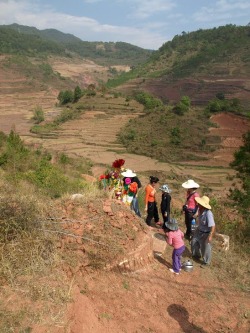 Our first stop - Zhang Yun's mum's grave For our fifth Qingming Jie (tomb-sweeping festival) in China we were honoured to be invited to Mohei by our good friend Zhang Yun, to visit her family, both living and deceased. Qingming is a time for remembering ancestors, visiting and cleaning the graves of departed relatives, placing flowers on tombs and burning ghost money. Getting to Mohei was the hardest part, as the rest of Simao was also on the move for this 3-day holiday. Mohei, an old village of wood-fronted houses, lies in a fertile valley half an hour north of Ning'er and is renowned for its salt mining, sausages and location on the Ancient Tea Horse Trail. It's about to find itself positioned once more on a major trade route as the new Kunming-Xishuangbanna expressway blasts through the outskirts of town.
After a quick lunch - including the best nimeng huang gua (lemon cucumber) I've ever had - we set off for the hills, stopping off briefly to buy all the necessary decorations and offerings. These included tinsel flowers, fake money and gold paper ingots. We also carried a large kettle of boiled spring water, food offerings and peach leaves, to ward off the ghosts (not the mosquitos, as Sue had us believe for a while!).
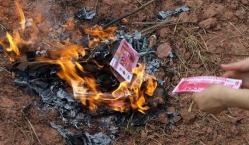 Zhang Yun burns 'ghost money' While Zhang Yun burned the money and the incense smouldered around the tomb, the men (Zhang Yun's uncles and boyfriend) smoked cigarettes, which they stubbed out on the ground and placed on the tomb's mantel. These weren't the only forms of litter we saw left at the tombs on the hillsides. Other graves were littered with plastic bags, paper cups, water melon peel, chopsticks and scraps of food. The first time we saw this, a few years back, we felt somewhat surprised that a tomb-cleaning ritual should end with the discarding of so much rubbish. This year I found myself reappraising the significance of this apparent disregard for aesthetics and the environment. Now I wonder if this litter is left as a mark of rememberance - clear evidence that relatives have paid a visit and the deceased was loved. As we left Zhang Yun's mum, her uncle called towards the tomb: "So, we all came to visit and we'll come again next year. We'll come again next year." The same ritual was carried out at each grave we visited.
Ali hanging out with "First Uncle", "Fifth Aunt" and "Seventh Aunt", at the old family home in Mohei. At 5pm all five living siblings and their mother (Zhang Yun's grandfather's "number two wife", now 86 years old) gathered with their families for a banquet. There were over 30 people there, including us, and all the dishes were prepared on a single solid-fuel-fired wok in a tiny kitchen. Our efforts to help were firmly refused but we did manage to contribute some watermelon and local sausage. 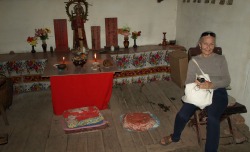 Sue taking a break at Mohei's temple, which we visited later in the day. 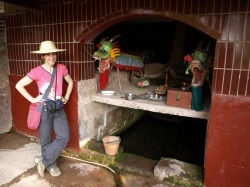 Resisting the temptation of the healing waters at Shui Jing Gong (Crystal Spring Temple). Ali, on the other hand, glugged down a ladleful and we're awaiting the side effects - good or bad.
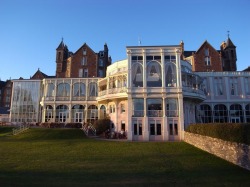 Whenever we come back to Scotland for a holiday, it's always very hard to fit everything and everyone in, especially as friends are dotted around the UK. What's more, it's even harder finding time to chat with the children around. Beth and I decided to have a few days away and booked in to the Creiff Hydro Hotel, in Perthshire. Ali and I went there in 2003, just before Edie came along, taking advantage of a 'winter special'.
It certainly was special, this time too. We made use of everything offered in the package - swimming pool, jacuzzi, sauna, gym,buffet breakfast, posh dining room and brasserie. We also had a long walk around the grounds and up a nearby hill. Unfortunately I had to wear flip-flops because I had a painful blister on my little toe. Coming from Yunnan, where most of the rural population wears flip-flops, it didn't seem that odd though my feet were VERY cold.
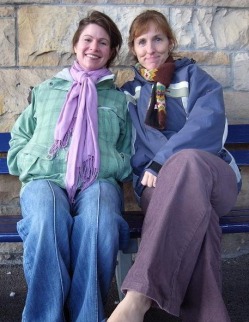 Beth and I met in Aberdeen in about 1995, when we both being interviewed for part-time lecturing posts at Aberdeen College and both got a job. I taught there for a year before starting my PhD. Beth stayed on and is now working as a lecturer in Angus College in Arbroath, where she is responsible for a great number of courses. Our paths have diverged but we are both firmly rooted in education and it was great to have a chance to share stories.
Beth and her husband, Steve, have three sons and there's never a dull moment. Last summer they treated us to a day out at the Landmark adventure park near Aviemore. This year the treat was getting away, just the two of us, to catch up on the last five years of our lives.
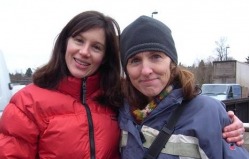 My mini-break in Perthshire began with a visit to some great old friends in Perthh - Laura (above), Rob and their children Emily and Finlay. Laura was studying medicine at Aberdeen University when I was doing my Phd so we've known each other for a few years now though sometimes struggle to find opportunities to meet up. When we came back to Scotland in 2007 they very kindly lent us their van, a Ford Freda coincidentally, with which we travelled round the north of Scotland. Laura and Rob also love the outdoors and take part in a number of sporting events. Rob's currently training for a 70-mile closed road cycle race in May. Good luck Rob!
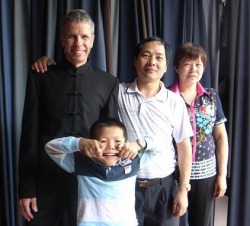 Ali with the tailor and his family It turns out that it's quite a prestigious affair; this going-to-the-Great-Hall-of-the-People-to-receive-the-Friendship-Award business has taken over our lives the last week. It seems that nothing in Ali's wardrobe would even have allowed him into the hotel where we'll be staying in. After trying to borrow and buy locally, we opted to have a suit made - a traditional tang zhuang style. Over the last few days we have also had to buy black shoes, a few shirts, a couple of ties and a tank-top (cheaper than a jacket). Amazingly enough, he's delighted with his new outfits and says he's going to dress like this all the time. Miracles do happen.
As for Lesley, she's had her own begging and borrowing to do but still has to go smart-shoe-shopping in Kunming as nothing in Simao fits her BFG-size 39 feet! The last few days have taken on an added frenzy due to work pressures. Lesley's been putting in solid 12-hour days at the office - enabling her to finish off the training materials (manual, workbook and resources) for the up-and-coming Team Leader-Trainer Training course that starts the first day back after the holiday. She's also been running round like a headless chicken doing all the admin work - getting name lists from the Education Bureaus, fighting with them to stick to the requirements (i.e. send Team Leaders), translate the lists, book hotels, finalise the budget proposal and get the funding promised from VSO, etc etc. The good news is that Hou Wanxia's role in the TDC should be formalised in the next month or two, which will increase her presence in the office. With our departure set for an hour and a half from now, Lesley is relieved to have printed the final draft of the books for proof-reading.
Now we just have to pack our glad-rags into cases and head to the Capital - the Provincial Capital that is! We are spending a few days in Kunming with Paul and his girlfriend, Ava. We've been looking forward to meeting her for a LONG time and Lesley's hoping to recruit her assistance to find some traditional Chinese shoes that will pass the dress code.
 I'm sure most of you will remember Marissa from previous blog entries. She graduated from the English Department in July 2008 and headed off to greener pastures to further her teaching qualifications. Since we saw here in Baoshan this summer she has been adjusting to her new life in the Provincial capital. Here's what she has to say:
“I’ve been here for nearly two weeks, but I haven’t got used to it yet. Actually, it disappointed me a lot when I first arrived here. I didn’t like Kunming at all. Compared to my previous college, the accommodation is a little terrible. Everything was strange, completely strange for me at first. What is worse, everyday things are quite expensive. I had a really miserable time on my first day here. I didn’t know where I could buy bedding and things for daily use. I had a really terrible job getting them in the end. Then, when I got back to my dormitory, I found that I had no key. I went to the dormitory- keeper but nobody there. I waited outside my dormitory, with my heavy luggage and my belongings. I couldn’t help bursting into tears immediately at that moment. I had done a lot of things from early in the morning till late evening; I carried my two suitcases and a big bag of books from miles away from here. I was terribly exhausted. I desperately wanted go home. I missed my family and my friends so much. I couldn’t imagine how I would survive here.
“A few days past, I discovered that university life is completely different from college life. The courses are more difficult and complicated. We’re required more basic knowledge and higher abilities in listening, speaking, reading and writing. What we need to learn is more profound. What's more, the teachers in the university have different teaching styles from those in college. They have higher and stricter requirements from us. I know it clearly that a much more serious competion and more pressure exist here. I must study really hard, or I’ll definitely fall behind the others.
“Frankly speaking, I dislike this place - the terrible conditions, the terrible teaching facilities and a few bad teachers. Although it’s a big city, a wealthy place, a real university compared to Simao Teachers’ College, I prefer the last one. I could feel that every teacher in Simao Teachers’ College was much better than any teacher in this university. How could I wish to go back to my previous college?! Anyway, no matter how difficult it is, I must calm myself down and try my best to adapt to it, because that’s my own choice. Now that I’ve chosen it, I certainly must bear it. Whatever I have to face, life is continuing and so is my studying. As that saying goes:
‘The teacher opens the door, you enter by yourself’.
So, I’ll adjust my state of mind to get accustomed to my present life, and proceed.”
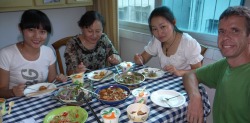 The Waiban Ladies and Ali. Ali cooked up a delicious Thai meal for our friends in the Foreign Affairs Office - otherwise known as the Waiban Ladies. Zhang Lingyu [right] spent nearly a year in Thailand, teaching Chinese and learning Thai, and was impressed by the authenticity of Ali's dishes. While she scoffed the Thai green curry with aubergines, Zhang Fei [left] and Mrs Gan [centre] stuck to the dishes more similar to Yunnan cooking. Lesley was heartbroken when they said they were too full to try her pudding. When the Banoffee pie came out of the fridge, however, they soon changed their minds.
It was a lovely evening. These women really make us feel at home in Simao and we know we can always turn to them for help and support. What's more, they're keen to keep our eat-our-way-around-the-world evenings going. They voted for Italian next. We'll have to see how Tina (half Italian) rates the authenticity of that meal!
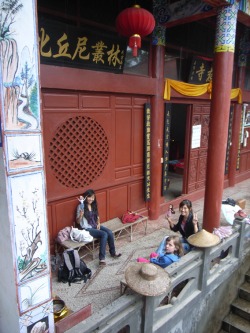 Freda, Magda & Roise, Longtang Temple. BAOSHAN - CHANGNING
It wouldn't seem right visiting a town without also finding its temple. Magda and Roise, two of the graduates we visited in Changning (2 hours from Baoshan by bus), were delighted to take us to Longtang Si, 10km out of town. Both of them had visited the temple before, Roise's last visit being only a few weeks before, when she prayed for success in her teaching exam. Although Magda and Roise were excellent students and did very well in their PIE teaching practice (2 months in rural schools), they failed to make the grades in the County teaching exams. They have both been working as teaching assistants - same work as teachers for a fraction of the pay (400-600RMB a month) - and are now looking to get a better job.
Becoming a teacher here is a bit like joining the army. Once registered with a local Education Bureau (usually their home town) they are at the mercy of leaders. Having passed her exam this time round (the prayers worked), I received a message from Roise saying that she had been posted to a small village several hours from Changning. They have no control over where they end up working, though a bit of guangxi (a complex concept that involves 'relations', 'contacts', 'favour') can improve one's chances of a favourable posting. There are ways to move between counties but it's a convoluted process that involves re-taking exams and pre-empting what the outcomes might be. It's much easier to stay at home.
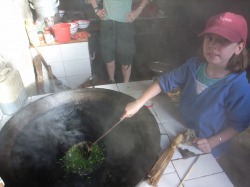 Freda preparing a tofu dish for dinner. JIUJIA VILLAGE
One of the highlights of our time in Changning was a visit to Jiujia village, where Magda is currently living with her boyfriend and his family. We bought lots of vegetables in Changning market and took over the farmhouse kitchen to prepare dinner. Our contributions consisted of lemon cucumber salad, baked aubergine and Freda's ma po doufu (tofu, tomato and herbs). Cooking in a giant wok, solid fuel (logs burning underneath) beats our tiny, ceramic hot plate in Simao. When all the dishes were ready we ate outside, at a small table in the courtyard. With our afternoon stroll around the village and country kitchen experience, this was a very memorable day.
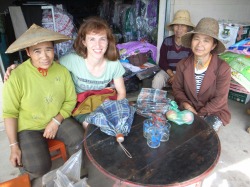 Lesley with the Jiujia foragers. On our exploration of the village we met these local women who were on their way home after a day of foraging. Their baskets were empty but they were in good spirits, especially after our chat, which covered the usual - age, nationality, salary (in that order). The markets have a lot of wild mushrooms for sale these days but there are a lot of people competing for this valuable source of income. Better luck next time ladies! 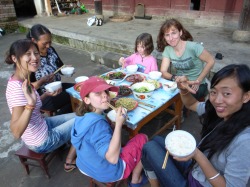 Dinner in the courtyard. Magda [front right] gets along well with her soon-to-be mother-in-law [back left, behind Roise], sharing the tasks of cooking and cleaning. Traditionally girls have been considered a burden to Chinese families, particulary if money is short. This isn't because of sexist misconceptions that women can't work as hard. On the contrary, Chinese women seem to be the backbone of the economy and keep many a family afloat while the men keep their brains afloat, with bai jiu (rice brandy). The main sense of burden comes from the fact that, traditionally, girls are brought up to be 'married out' to another family. They are cared for, educated and then sent off with a dowry to care for a husband and all his relatives. Young women often found themselves 'married in' to a family that treated them as a slave. What's more, if they didn't produce a son within 9 months of being married, they'd find themselves replaced with 2nd, 3rd or 4th wives and concubines. Although much of this has changed, it's still common for newlyweds in the countryside to live with one of their families, to help take care of their ageing parents and take over the farm.
Magda is delighted to have found in-laws who respect her. We also enjoyed getting to know her new family. Magda and her boyfriend hope to get married some time in the next year. Freda and Edie have already been asked to be bridesmaids, if we are still in China.
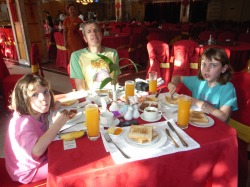 ELF with their 'Western' breakfast JINGHONG Our pre-term backpacking trip started in Jinghong, where we 'lived it up' for twenty-four hours in the Banna Hotel. The main draw was the swimming pool [pictured below] but it turned out the room rate included a 'Western breakfast'. As well as having a waitress-served menu including toast, bacon, eggs, coffe and fruit juice (well, orange squash), we were seated at a small table in the corner while the rest of the (Chinese) guests were crammed into a buffet area. By the time we finished our silver service indulgence the rest of the dining room had cleared. Not bad for 200 RMB - that's for four of us!
 LEAF at the Crown Hotel swimming pool. We enjoyed Jinghong much more this time, perhaps because we know our way around and can find everything we need - supermarket, tasty food and swimming pools. What's more, we've found a string of sparkling new hotels with cheap twin rooms (40 RMB) that are clean and central. We'll be heading down for regular weekend retreats. Although it's less than a couple of hours by bus, it feels very different to Simao - more tropical with a strong South-East Asian (and Dai) influence. There are even traveller-types sitting around drinking milkshakes in Western cafes. All a bit surreal coming from Simao. 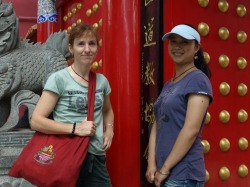 Lesley and Marissa, Baoshan temple. BAOSHAN As time was short we flew from Jinghong right up to Xiaguan (Dali City) to leave us with just a 2-hour bus ride to Baoshan. We spent a night there, but squeezed in some sightseeing with Marissa and one of her school friends. The best part was exploring Baoshan's old city park, which covers a hillside on the west edge of town. This temple had been spruced up more than any other I've visited in China. Unfortunately the main prayer hall was shut because the monks, all women with beautifully done-up hair, were out front arguing with builders about pathwork underway. From the temple we even managed to spy on some new army recruits having marching and Kung Fu lessons on an adjacent military exercise ground.
It was in Baoshan that we discovered the first of the holiday's culinary delights - rice noodles with green bean mush. It doesn't sound very good but we lived off this this local delicacy for two days!
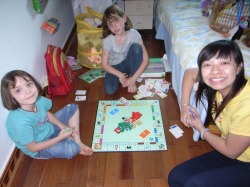 Today we had a visit from Lucia, an English teacher from RSL, the language school where Paul works in Kunming. After coffee and lemon cake Freda and Edie entertained Lucia with their toys, a story and then monopoly, China version. It's reminding me of the 1960s anti-West propaganda whereby Chinese who showed any interest in anything, well, outwith China (people, literature, business) were branded, 'capitalist roaders', as well as other things. They were either sent to the countryside for the rest of their lives (harsh conditions in those days), imprisoned or executed. That was after public humiliation and torture. Let's hope the same fate doesn't await Lucia when she returns to Kunming. At least she's playing the 'China Version', which may act in her defence. That doesn't mean property is equally shared out amongst players - it means (as ever) that the cunning, astute, manipulative elite win. Are we talking of 'capitalism' or 'communism' now?
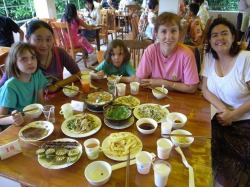 ELF with Marissa and Tina, about to tuck into some mi xian (rice noodles) and other delights at Ludao Restaurant. Our recently graduated friend, Marissa, is about to embark on a new journey - she has enrolled for a two-year postgraduate certificate in education at a university in Kunming. Marissa has been involved with lots of LEAF family activities, and celebrated Spring Festival with us earlier this year. She has also tutored Freda during difficult homework periods and looked after Dougal and the fish when we've been on holiday. We've also shared many a meal with Marissa, including some 'Western style' home-cooking. We'll miss her, and wish her all the very best for her studies in Kunming.
|


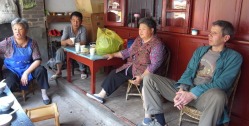


















 RSS Feed
RSS Feed